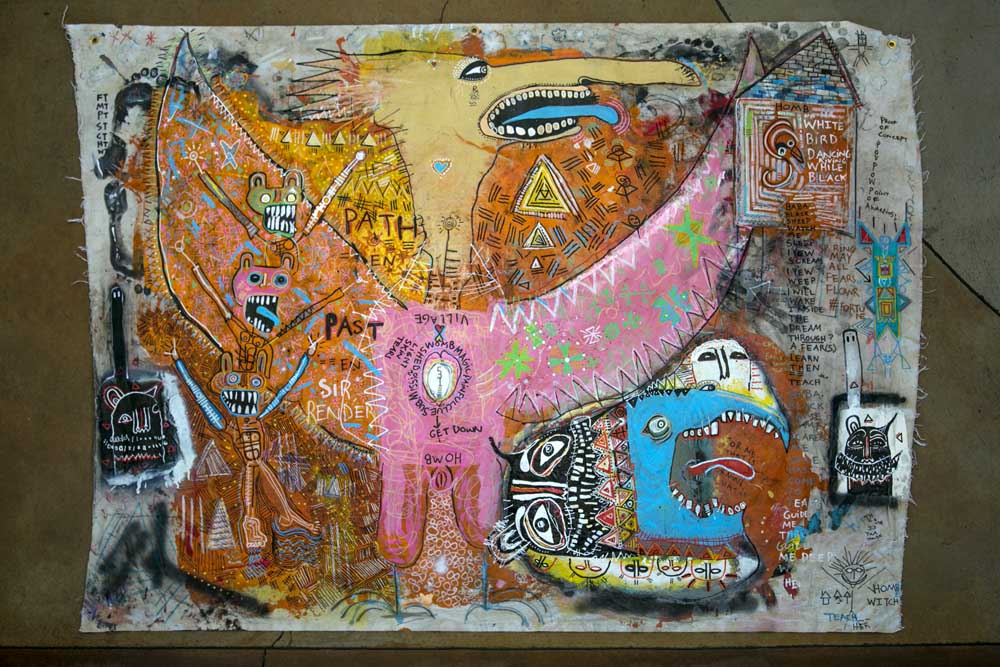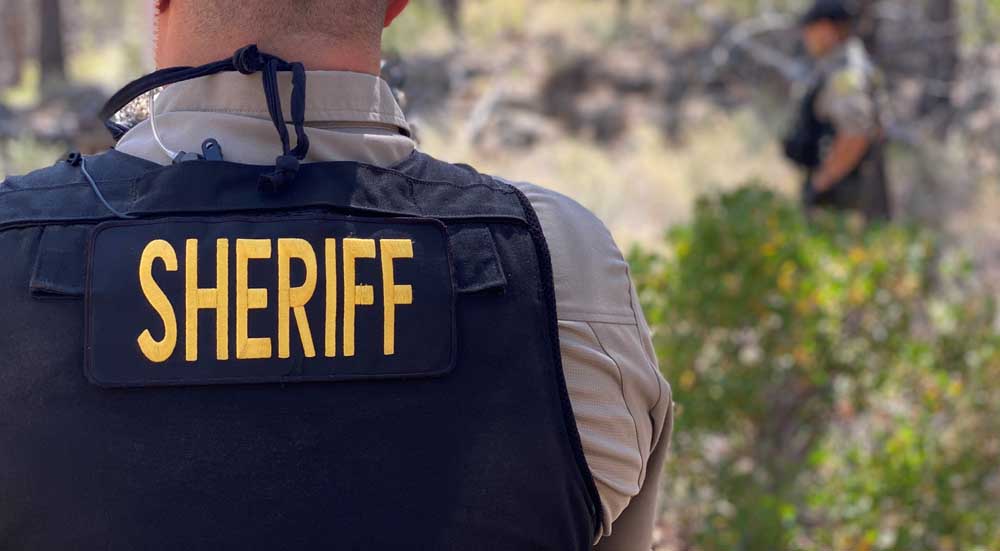MOsley WOtta: Poet, Performer, Artist, Educator
Published 12:00 am Saturday, March 31, 2018

- MOsley WOtta: Poet, Performer, Artist, Educator
Jason Graham is many things. He is a painter, a slam poet, a musician, and a father, familiar throughout the region as MOsley WOtta, or MOWO. Graham comes home to a wife and three children. He folds laundry and digs through the pantry to help make dinner, and, just like us, he converses in series dialogues in the bathroom. His art speaks to us because he is living life on the ground right alongside us.
“I’m really appreciating this family and how hard it is and how fragile it is and how much I love it,” Graham said about what is most important to him in life right now. “I’m a slow learner, and I’m doing something right because I love this family enough to want to go through this life with them. It’s hard going through this alone, and even harder with others.”
While Graham admits that the easiest life would be simply retreating to the top of a mountain and contemplating, he aims to wade through the weeds of human vulnerability with art and verse. A passionate community figure in Central Oregon for years, he uses art to feel at home and conduct conversations about the hard things in this world that need to be discussed.
“I want to be a champion of exploring our commonalities and celebrating our differences,” he said.
Born in Chicago, Graham moved to Bend in the early 1990s, where he attended high school and Central Oregon Community College, studying art, English, and theater. He never necessarily felt at home here, or in Chicago, but found belonging in performance. By engaging and intersecting with performing art, he felt safe and supported and free to be.
“Because I have felt somewhat uncomfortable and awkward for so long,” Graham said, “you end up learning how to deal with that—often to withdraw or overexpose—and I can do both on the stage.”
Graham has always enjoyed finding the beat that no one is really interested in, and embodying a different style while flexing a different vocabulary. In his youth, he would reclaim garbage to make art, and after college he rapped with the local hip hop group Person People. The group was an “imperfectly perfect consortium of creatives” who knew that “there is a truth to be found, and a truth to be shared.” They were also “Oregon as f***.”
Graham would often freestyle with the other members of Person People as part of the creative process, and partly as a good time. Freestyle is a magical thing for Graham. Ideas that are not his own appear in the open space of freedom and play, of knowing and not knowing, of exchange from oneself and to another. He wonders sometimes where the assist comes from and compares freestyle to being in a river. Sometimes you go with the current, and sometimes against it—sometimes both.
“Running through a forest for the first time is freestyle, writing is freestyle, looking in the pantry to find something to feed the kids is freestyle,” Graham said. “It happens all over the place, all the time.”
Graham participated in local slam poetry events in Bend and went on to become a champion Oregon slam poet. He served as an art ambassador with Bend-based nonprofit Rise Up International and, in partnership with the U.S. Embassy, traveled to Australia, Fiji, and the United Arab Emirates to help conduct workshops in museums, schools, and community places. The gatherings to explore writing, spoken word, art, and performance were also intended to encourage communication through creativity and could sometimes serve as an entrepreneurial beginning for participants.
Locally, Graham works with all ages to help individuals share and spread their personal truths and inspired genius. He has worked with youth at Caldera Arts Center and with Oregon Humanities Conversation Project to prompt discussions about important human issues, often related to local community.
“Jason immediately brings everyone into the room and gets participants comfortable enough to take risks, think about their convictions, and enjoy themselves—all at the same time,” explained Adam Davis, executive director of Oregon Humanities. “He leads with his own pretty remarkable combination of intelligence, presence, and playfulness. He also has a deep confidence in himself and in the fruitfully unpredictable character of human interaction.”
As an artist and active community member of Bend, Graham sees and appreciates the pioneering and frontier spirit that founded this industrial mill town. His own visual artwork is sometimes described as urban (from its inspired graffiti and street-art feel) and is powered by indigenous artwork of universal concepts and shapes.
He landed in Bend during one of the original booms and has been witness to its subsequent growth. He relates Bend to prayer beads, or your father’s shoes or your mother’s dress—you have to wear it for awhile, grow into it (or perhaps out of it), over time.
“I’m critical of this town,” said Graham, “but I want to participate in the future of this town. This place can be everything it advertises, but it isn’t yet.”
Because Bend is still small enough, Graham knows that we can still influence our direction and growth. We can, as individuals, make a real difference in the development of our communities. He asks us to think about how we address the real needs of the people and the land here.
Graham also encourages us to confront the uncomfortable things that we don’t want to talk about—slavery, misogyny, pedophilia, suicide, drug abuse—because if they are not made conscious, they can manifest externally. Art helps us to approach hard subjects with honesty; it is a way to talk and evolve through them without perpetuating them.
“Art is an imperfect and clunky tool,” Graham said, “but it is a way we have to express what is happening to us and to help steer culture and the future.”
Graham, as a musician, currently plays with Colten Tyler Williams. The duo began a friendship about 15 years ago when Williams, who was attending COCC at the time, went to the library and saw an exhibit of Graham’s artwork. He immediately loved the style and connected with Graham.
Now Williams creates the music and shapes the beats for the duo, and every few days he sends over tracks for Graham to write lyrics to if he is moved by a rhythm. Graham tells stories or shares a message with word play and, according to Williams, asks the audience to think for themselves, do the work for themselves, make decisions for themselves, trust in themselves, and be good to one another.
“What is inspiring about him,” Williams said of his friend, “is that he is always trying to inspire other people. Whether it is with lyrics or atmosphere and feeling at a show, he takes the performing seriously. He tries to push people’s buttons a little bit and tries to make them think.”
When the tracks are complete, the musicians send them to Rory Restani at Oxiliary for a final mix and mastering. Graham and Restani have known each other for more than a decade, as friends and colleagues.
“From his artwork and music come the creative patterns that he does with word play and symbolism,” said Restani about Graham, “but more than that it is the raw ideas that he has about certain situations that people may be afraid to talk about, or uncomfortable to talk about, and want to shove back. He likes to keep that stuff at the surface level, so it is thought-provoking to look at his artwork or listen to his music.”
One of the greatest wars is the one within, said Graham, and he sometimes contributes to the very things he is fighting against. Yet it is important to look into the shadows, which he recognizes in his art.
“If we refuse to confront the shadow,” Graham said, “we are going to be blinded by looking at the light.”
Vulnerability is a main theme that Graham explores in his work. For him, vulnerability is knowing something with certainty, but the application of that certainty is unknown. Like having wings, but not knowing how to flap them, and then jumping into a void.
Creativity is a way to dive into that abyss, and somehow it steers us to what is most frightening, but what yields the most growth. Creativity helps us to go into battle, naked, without even a weapon, or to continually push forward into the pounding surf.
“This,” he said, “is what we are always dealing with.”
One aspect of vulnerability, Graham explained, is similar to intuition and innocence.
“Your instinct comes from your innocence,” he said, “and that feels so good that I don’t even need to think about if it’s true.”
In some ways, his name, MOsley WOtta, stems from this sense of innocence. It is a means of remembering that we are all at our essence composed of the same thing—we are all mostly water—and that at our most innocent, intuitive, infant state, our bodies consist primarily of water, more than they ever will again.
“MOsley WOtta . . . the Earth is. And babies are.”
MOWO’s music and art intend to connect us, and his upcoming collection includes art, live performance, and recordings for exhibition. The first single, “Frown 1,” will be released this year from Graham and Williams’ larger body of work.
Graham’s output in the community encourages us to look at what we want to avoid while also rejoicing in the beauties of life—including all those unexpected moments that happen in a day.
“To have an experience,” Graham said, “means that we are here to participate, and to keep participating.”








